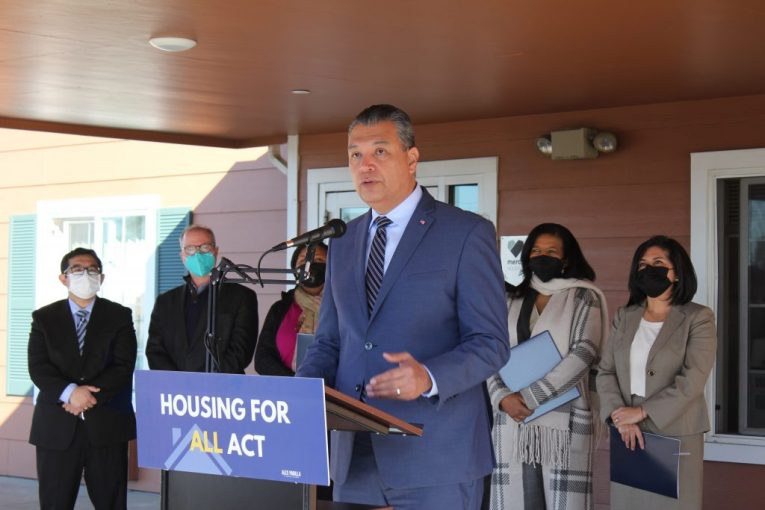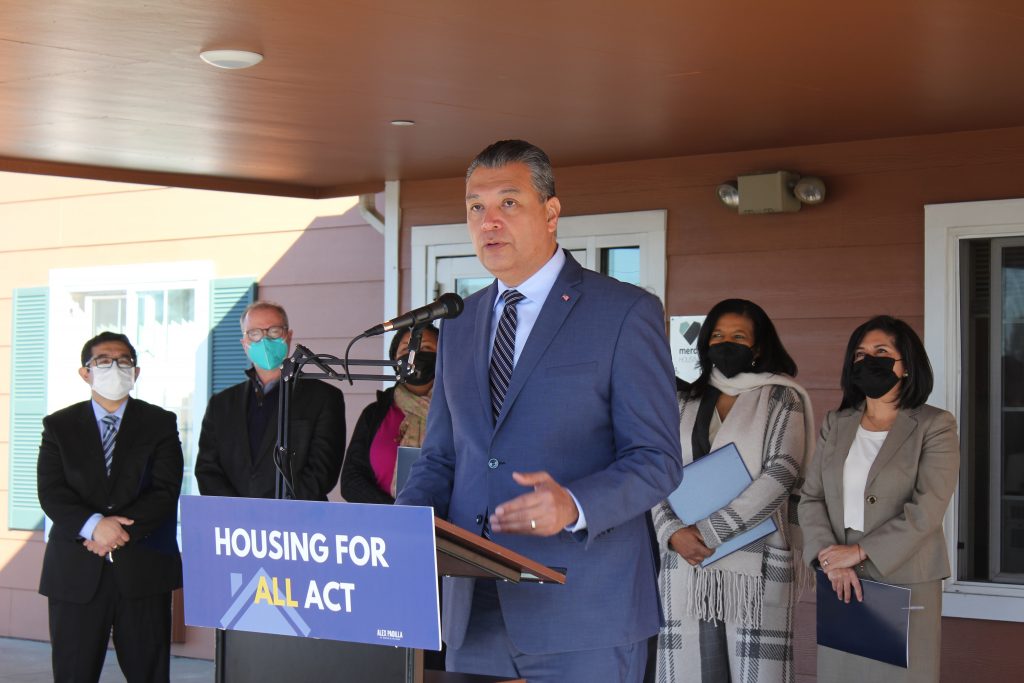

By David M. Greenwald
Executive Editor
Sacramento, CA – With the housing crisis looming in California, Senator Alex Padilla wants to bring federal resources to bear on issues of affordable housing and homelessness.
On Friday, the Senator announced comprehensive legislation to address the affordable housing and homelessness crises in California and across the country.
The Housing for All Act of 2022 he says, “would invest in proven solutions to address critical affordable housing shortages and provide a surge of funding for strategic, existing programs to reduce homelessness as well as for innovative, locally-developed  solutions to help those experiencing homelessness.”
solutions to help those experiencing homelessness.”
“Every person has a right to the dignity and security of housing,” said Senator Padilla.
“As we continue to face historic affordable housing and homelessness crises, which have been exacerbated by the COVID-19 pandemic, it’s going to take all levels of government working together to rebuild a more inclusive and equitable society for all,” the Senator said.
He added, “This legislation is an opportunity to invest and align resources in expanding affordable housing and strengthening proven solutions. Affordable housing is essential infrastructure, and that’s why I am proud to introduce the Housing for All Act of 2022 to ensure that every person has a place to call home.”
The announcement occurred in Sacramento with local leaders and advocates at La Mancha Way Apartments, a Project Homekey site in Sacramento.
“The site operates in an innovative partnership with the Sacramento Housing Redevelopment Agency to purchase hotels and motels that can be rehabilitated into permanent, long-term housing for people experiencing homelessness,” his release noted. “The investments in the Housing For All Act would build on these creative solutions that cities and states in California have successfully developed.”
The National Low-Incoming Housing Coalition estimates that the United States has a shortage of 6.8 million affordable homes available to low-income renters.
In California, more than 1.4 million units are needed to address the affordable housing shortage, and more than 161,000 people experience homelessness in the state each night—including families with young children, veterans, and victims of domestic violence.
Prior to the pandemic, one in four renters spent half of their monthly income on rent, and nearly one million tenants were evicted each year.
California Democrats Ted Lieu and Salud Carbajal in the House will introduce companion legislation.
“Homelessness remains a persistent and difficult problem in Los Angeles and in communities around the country,” said Representative Ted Lieu.
Lieu believes that this legislation will help “to address the affordable housing shortage and support proven, community-driven solutions to homelessness.
“The pandemic only worsened the economic and societal factors that contribute to homelessness, which is why it is so important that we address this issue head-on now. Homelessness is a complicated challenge that requires a multi-faceted approach,” Lieu said.
Governor Newsom believes that attention needs to be brought to California and the nation’s affordability crisis.
The governor said, “The pandemic only worsened the economic and societal factors that contribute to homelessness, which is why it is so important that we address this issue head-on now. Homelessness is a complicated challenge that requires a multi-faceted approach.”
According to the senator’s office the legislation would address the affordable housing shortage “by investing in the National Housing Trust Fund, the HOME Investment Partnerships program, the Section 202 Supportive Housing for the Elderly Program, and the Section 811 Supportive Housing for People with Disabilities.”
It would address the homelessness crisis through an investment in Housing Choice Vouchers, Project-Based Rental Assistance, the emergency solutions grant program (which helps with street outreach, rapid re-housing assistance, emergency shelter, and homelessness prevention), and Continuums of Care.
Finally, it would seek to support innovative, locally developed approaches to these crises by investing in hotel and motel conversions to permanent supportive housing with supportive services.
In addition, it would continue investment in the Eviction Protection Grant Program, and aid the mobile crisis intervention teams to help those with medical or psychological needs avoid the criminal justice system.
It would also put money into libraries that support people experiencing homelessness and programs that offer a safe place to park overnight; facilitate access to rehousing services and essential services; and invest in inclusive, transit-oriented development and infill development.
Representative Carbajal noted that Naomi Schwartz Safe Parking Program Act is advancing in the U.S. Senate as a part of Senator Alex Padilla’s Housing for All Act.
Carbajal said, “This comprehensive legislation package will help us address the core issues of homelessness and affordable housing in California and across the nation.”
He noted that this legislation “will be another step toward our goal of ensuring every American has a roof over their head.”
Meanwhile the mayors of nine of California largest cities signed on, including Mayor Breed of San Francisco, Mayor Garcetti of Los Angeles and Mayor Steinberg of Sacramento.
In a joint statement they noted, “As the Mayors of some of California’s largest and most populated cities, we are all grappling with the housing and homelessness crisis.”
They added, “The ‘Housing for All Act of 2022’ would invest in proven solutions to housing shortages, fund programs that have been proven to reduce homelessness, and strengthen innovative, locally-developed programs to appropriately engage with those experiencing homelessness.”
CSAC (California State Association of Counties), an organization of counties, came out strongly in support of the measure “which addresses the severe lack of affordable housing across all communities and counties in California.”
CSAC President and Siskiyou County Supervisor Ed Valenzuela said, “This important bill provides an array of investments to bolster California’s historic efforts in the affordable housing and homelessness crises. CSAC looks forward to working with Senator Padilla and our state and local partners to address these challenges.”
Housing advocates are supporting the measure as well.
“The pandemic has magnified and accelerated the country’s affordable housing crisis, a central cause of housing instability, eviction, and homelessness,” said Diane Yentel, president and CEO of the National Low Income Housing Coalition.
Meanwhile Steve Berg of the National Alliance to End Homelessness noted that the “legislation would promote innovative policies like using motels and hotels for permanent supportive housing and specific efforts to help house the growing numbers of individuals and families experiencing vehicular homelessness.”
“The research is clear—lack of affordable housing is at the root of many societal issues, including health and educational disparities,” said Professor Matthew Desmond of Princeton University’s Eviction Lab.


As we have seen such policies and mass monies only lead to unintended consequences that hurt low-income, homeless, addicts, cities, society. Book mentioned a few days ago in DV, San Fransicko by Michael Schellenberger is must read. He is progressive who became disillusioned by clearly more invested but problem keeps getting worse. A great read for progressives who may be starting to see themselves that these policies aren’t working.
I’d say more but why bother?
Just happened-across the following article, which confirms something I’ve suspected:
One reason the wealth gap keeps growing: Poorer Americans don’t know when it’s best to buy or sell a home (msn.com)
Might this be a form of Darwinism?
Here’s some advice: Buy low, sell high.
Or, don’t sell at all, if you need a place to live.
I’ve seen folks who have bought/sold (and moved) more often than others. Which didn’t work out too well for them.
And in this same light: By all means, try to purchase (or live) in an area that’s already increased in market value beyond all reason, and beyond that which most wages can support. (With the exception of those already at the top of earnings.)
I’d suggest trying to build a bunch of affordable housing in Los Angeles, for example – where it’s costing $600K per each affordable housing unit.
And don’t forget to overlook areas in which this hasn’t occurred so far. No sense in encouraging people to live in places they can actually afford.
On – and keep adding jobs (especially on the upper end of the scale, for which the “unwashed masses” don’t qualify for) which exacerbates the problem.
And then, when well-connected businesses start howling, take it out on long-term residents (who resent your businesses’ presence and impact in the first place).
(I’m starting to think that I’m qualified to be a state official, or at least a YIMBY supporter.)
And during the pandemic, many renters spent none of their monthly income on rent (but could not be evicted). Instead, the government paid it for them (or has agreed to do so).
Evictions (and the threat thereof) are needed in the market-based system that we have. Otherwise, there will be no vacancies.
Turns out that there’s lots of “artificial” market demand for free places to live. Actually, that’s true of most things that would otherwise cost money.